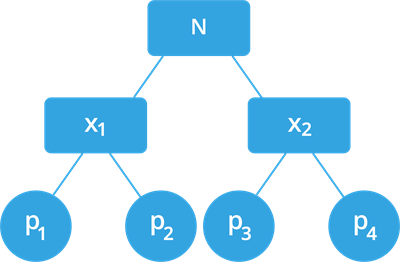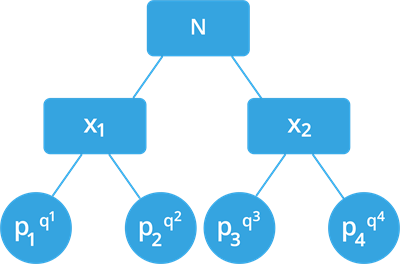UPSKILL MATH PLUS
Learn Mathematics through our AI based learning portal with the support of our Academic Experts!
Learn moreTheorem:
Every composite number can be expressed (factorised) as a product of primes, and this factorisation is unique, apart from the order in which the prime factors occur.
Explanation:
Let us take the composite number N.
Decompose the number N into the product of primes.

Here, the number N = x_1 \times x_2. But, both x_1 and x_2 are again a composite number. So, factorise it further to obtain a prime number.
The prime factors of x_1 = p_1 \times p_2.
The prime factors of x_2 = p_3 \times p_4.
We get, N = p_1 \times p_2 \times p_3 \times p_4 where p_1, p_2, p_3 and p_4 are all prime numbers.
If we have repeated primes in a product, then we can write it as powers.

In general, given a composite number N, we factorise it uniquely in the form where are prime numbers, and are natural numbers.
Thus, every composite number can be expressed as a product of primes apart from the order.
Example:
Consider a composite number 26950.
Let us factor this number using the factor tree method.

The prime factor of 26950 = 2 \times 5 \times 5 \times 7 \times 7 \times 11.
That is, 26950 = 2 \times 5^2 \times 7^2 \times 11.
Here, a composite number 26950 is written as a product of prime numbers.
If we change the order of the prime numbers, then also the answer will be the same composite number.
We can write 26950 = 2 \times 7^2 \times 5^2 \times 11 or 26950 = 11 \times 7^2 \times 5^2 \times 2.
Thus, the prime factorisation of a natural number is unique, except for the order of its factors.
Significance of the fundamental theorem of arithmetic
1. If a prime number p divides ab, then p divides either a or b. That is, p divides at least one of them.
Example:
Let us take a prime number 3 divides 5 \times 6.
Here, 3 cannot divide 5, but it divides 6.
That is, a prime number p divides at least one of them.
2. If a composite number n divides ab, then n neither divide a nor b.
Example:
Let us take a composite number 4 divides 2 \times 6.
Here, 4 neither divide 2 nor divide 6. But, it divides the product of 2 \times 6 = 12.
Thus, if a composite number n divides ab, then n neither divide a nor b.
Important!
Recall:
HCF = Product of the smallest power of each common prime factor in the numbers.
LCM = Product of the greatest power of each prime factor involved in the numbers.